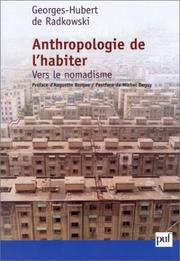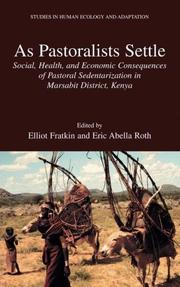| Listing 1 - 5 of 5 |
Sort by
|

ISBN: 2130523951 9782130523956 Year: 2002 Publisher: Paris : Presses universitaires de France,
Abstract | Keywords | Export | Availability | Bookmark
 Loading...
Loading...Choose an application
- Reference Manager
- EndNote
- RefWorks (Direct export to RefWorks)
Cet ouvrage rassemble les textes de G-H de Radkowski entre 1963 et 1968. L'ordre des textes a été choisi en fonction de leurs complémentarités. Radkowski axe sa réflexion sur le thème du nomadisme qu'il explore à la fois dans un passé antérieur à la sédentarité, mais aussi au delà de celle-ci
Human settlements --- Residential mobility --- Sociology, Urban --- Etablissements humains --- Mobilité résidentielle --- Sociologie urbaine --- Human settlements. --- Residential mobility. --- Sociology, Urban. --- Nomads --- Anthropologie --- Habitat --- Nomade --- Anthropologie de l'espace --- Anthropologie urbaine --- Sedentarisation. --- CDL --- 72.01 --- Mobilité résidentielle --- Sedentarisation --- Établissements humains. --- Mobilité résidentielle. --- Sociologie urbaine. --- Nomades --- Homme --- Urbanisation --- Dwellings --- Human beings --- Sédentarisation. --- Anthropologie. --- Anthropology. --- Sedentarization. --- Nomads - Sedentarisation
Book
ISBN: 1501752014 1501730444 9781501730436 1501730436 9781501752018 9781501730450 1501730452 9781501730443 Year: 2018 Publisher: Ithaca [New York]
Abstract | Keywords | Export | Availability | Bookmark
 Loading...
Loading...Choose an application
- Reference Manager
- EndNote
- RefWorks (Direct export to RefWorks)
The Hungry Steppe examines one of the most heinous crimes of the Stalinist regime, the Kazakh famine of 1930-33. More than 1.5 million people perished in this famine, a quarter of Kazakhstan's population, and the crisis transformed a territory the size of continental Europe. Yet the story of this famine has remained mostly hidden from view. Drawing upon state and Communist party documents, as well as oral history and memoir accounts in Russian and in Kazakh, Sarah Cameron reveals this brutal story and its devastating consequences for Kazakh society.Through the most violent of means the Kazakh famine created Soviet Kazakhstan, a stable territory with clearly delineated boundaries that was an integral part of the Soviet economic system; and it forged a new Kazakh national identity. But this state-driven modernization project was uneven. Ultimately, Cameron finds, neither Kazakhstan nor Kazakhs themselves were integrated into the Soviet system in precisely the ways that Moscow had originally hoped. The experience of the famine scarred the republic for the remainder of the Soviet era and shaped its transformation into an independent nation in 1991.Cameron uses her history of the Kazakh famine to overturn several assumptions about violence, modernization, and nation-making under Stalin, highlighting, in particular, the creation of a new Kazakh national identity, and how environmental factors shaped Soviet development. Ultimately, The Hungry Steppe depicts the Soviet regime and its disastrous policies in a new and unusual light.
Collectivization of agriculture --- Nomads --- Famines --- History --- Sedentarization --- Soviet Union --- Collectivisation de l'agriculture --- Collectivization of agriculture. --- Famines. --- Hungersnot. --- Kollektivierung. --- Nomades --- SOCIAL SCIENCE --- Weidewirtschaft. --- Histoire --- Sédentarisation --- Sedentarization. --- Anthropology --- Cultural. --- 1900-1999. --- Kasachische ASSR. --- Kazakhstan. --- Soviet Union. --- URSS
Book
ISBN: 1447310969 1847428746 1847428738 1299766048 Year: 2013 Publisher: Bristol : The Policy Press,
Abstract | Keywords | Export | Availability | Bookmark
 Loading...
Loading...Choose an application
- Reference Manager
- EndNote
- RefWorks (Direct export to RefWorks)
This is the first published research from the UK to address the neglected topic of the increasing settlement of gypsies and travellers in conventional housing. It highlights the complex and emergent tensions and dynamics inherent when policy and popular discourse combine to frame ethnic populations within a narrative of movement.
Nomads --- Romanies --- English Travellers (Nomadic people) --- Irish Travellers (Nomadic people) --- Irish Travelers (Nomadic people) --- Irish Travelling People (Nomadic people) --- Travelers, Irish (Nomadic people) --- Travellers, Irish (Nomadic people) --- Travelling People, Irish (Nomadic people) --- English Travelers (Nomadic people) --- English Travelling People (Nomadic people) --- Travelers, English (Nomadic people) --- Travellers, English (Nomadic people) --- Travelling people, English (Nomadic people) --- Nomadic peoples --- Nomadism --- Pastoral peoples --- Vagabonds --- Wanderers --- Persons --- Herders --- Great Britain --- Social conditions. --- Nomads. --- Romanies. --- POLITICAL SCIENCE --- SOCIAL SCIENCE --- BUSINESS & ECONOMICS --- Business economics --- Economics --- Industrial management --- Management --- Microeconomics --- Behavioral sciences --- Human sciences --- Sciences, Social --- Social science --- Social studies --- Civilization --- Administration --- Civil government --- Commonwealth, The --- Government --- Political theory --- Political thought --- Politics --- Science, Political --- Social sciences --- State, The --- Descriptive sociology --- Social conditions --- Social history --- History --- Sociology --- Bohemians (Romanies) --- Gipsies --- Gitanos --- Gypsies --- Kalderash --- Manush --- Roma (People) --- Romani --- Sinti --- Sedentarisation of nomads --- Sedentarization of nomads --- Settlement of nomads --- Housing. --- Sedentarization. --- Public Policy --- Social Services & Welfare. --- General. --- Infrastructure. --- Sedentarization --- Sedentarisation --- Great Britain. --- Housing
Book
ISBN: 9780295748184 0295748184 9780295748191 0295748192 0295748206 Year: 2020 Publisher: Seattle : University of Washington Press,
Abstract | Keywords | Export | Availability | Bookmark
 Loading...
Loading...Choose an application
- Reference Manager
- EndNote
- RefWorks (Direct export to RefWorks)
"At the start of the new millennium, the Chinese government launched an ambitious new development program with far-reaching economic, environmental, and cultural effects in remote areas inhabited mainly by indigenous ethnic groups. The Great Opening of the West program diverts pastoral Tibetans to urban residence and urban livelihoods, resulting in a massive shift in social and economic patterns. Based on fieldwork that has been ongoing since 2007, this ethnography documents the transformation of Tibetan pastoral society in Qinghai Province under Chinese development efforts. It describes sedentarization and relocation policy agendas, viewpoints of both the affected pastoral population and officials charged with implementing policy, and case studies of pastoralists' response to sedentarization and other grassland management policies"--
Tibetans --- Nomads --- Herders --- Grasslands --- Range policy --- Forced migration --- Pastoral systems --- Economic development projects --- Development projects, Economic --- Projects, Economic development --- Economic assistance --- Technical assistance --- Herding systems --- Pastoralism --- Animal culture --- Livestock systems --- Herding --- Cleansing, Ethnic --- Compulsory resettlement --- Ethnic cleansing --- Ethnic purification --- Involuntary resettlement --- Migration, Forced --- Purification, Ethnic --- Relocation, Forced --- Resettlement, Involuntary --- Migration, Internal --- Range management --- Rangelands --- Grass lands --- Lands, Grass --- Grasses --- Ethnology --- Tibeto-Burman peoples --- Herdsmen --- Stockmen (Animal industry) --- Livestock workers --- Livestock --- Nomadic peoples --- Nomadism --- Pastoral peoples --- Vagabonds --- Wanderers --- Persons --- Cultural assimilation --- Sedentarization --- Economic conditions --- Management --- Government policy --- Zêkog Xian (China) --- Tse-kʻu Hsien (China) --- S06/0240 --- S24/0800 --- China: Politics and government--Policy towards minorities and autonomous regions --- Tibet--Social conditions (incl. ethnography) --- Tibetans: cultural assimilation: China. --- Nomads: sedentarization: China. --- Herders: China. --- Tibetans: China: economic conditions. --- Grasslands: China. --- Forced migration: China. --- Pastoral systems: China. --- Economic development projects: China. --- Sedentarisation of nomads --- Sedentarization of nomads --- Settlement of nomads --- Tibetan diaspora --- Migrations. --- Sedentarization. --- Sedentarisation --- Rtse-khog Rdzong (China)

ISBN: 1280312947 9786610312948 0306485958 030648594X 1441934626 Year: 2005 Publisher: New York, NY : Springer US : Imprint: Springer,
Abstract | Keywords | Export | Availability | Bookmark
 Loading...
Loading...Choose an application
- Reference Manager
- EndNote
- RefWorks (Direct export to RefWorks)
The Social, Health, and Economic Consequences of Pastoral Sedentarization in Marsabit District, Northern Kenya ERICABELLA ROTH AND ELLIOT FRATKIN 1. INTRODUCTION Formerly nomadic livestock-keeping pastoralists have settled in many regions of the world in the past century. Some groups, including those in the former Soviet Union, Iran, and Israel, have settled in response to state-enforced measures; others including Saami in Norway or Bedouins in Saudi Arabia, in response to changing economic opportunities. East Africa, home to many cattle- and camel-keeping pastoral societies, has been among the most recent to change. The shift to sedentism by East African pastoralists increased d- matically in the late 20th century as a result of sharp economic, political, demographic, and environmental changes. Prolonged drought, population growth, increased reliance on ag- culture, and political insecurities including civil war and ethnic conflict have all affected the ability of pastoralists to keep their herds. Still, the majority of pastoralist households in Kenya, Ethiopia, Somalia, and Tanzania remain committed to raising livestock, even as they adapt to farming or urban residence. Pastoral production remains a major economic focus in the savannas and scrub deserts of Africa, due to both its ecological adaptability and the economic incentive to market livestock and their products (Fratkin, 2001). Pastoralists settle for a variety of reasons, some in response to ‘pushes’away from the pastoral economy, others to the ‘pulls’of urban or agricultural life.
Nomads --- Sedentarisation. --- Marsabit District (Kenya) --- Economic conditions. --- Social conditions. --- Nomadic peoples --- Nomadism --- Pastoral peoples --- Vagabonds --- Wanderers --- Persons --- Herders --- Anthropology. --- Population. --- Environmental management. --- Population Economics. --- Environmental Management. --- Public Health. --- Environmental stewardship --- Stewardship, Environmental --- Environmental sciences --- Management --- Human population --- Human populations --- Population growth --- Populations, Human --- Economics --- Human ecology --- Sociology --- Demography --- Malthusianism --- Human beings --- #SBIB:39A4 --- #SBIB:39A73 --- Sedentarization --- Toegepaste antropologie --- Etnografie: Afrika --- Public health. --- Community health --- Health services --- Hygiene, Public --- Hygiene, Social --- Public health services --- Public hygiene --- Social hygiene --- Health --- Human services --- Biosecurity --- Health literacy --- Medicine, Preventive --- National health services --- Sanitation --- Primitive societies --- Social sciences
| Listing 1 - 5 of 5 |
Sort by
|

 Search
Search Feedback
Feedback About
About Help
Help News
News